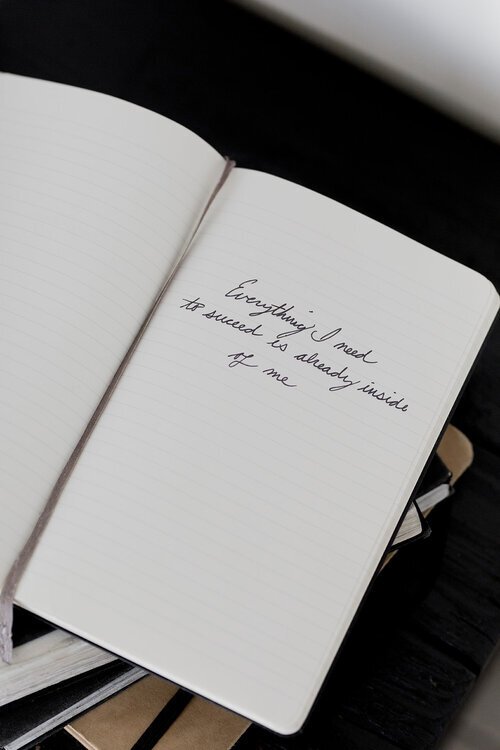
How I Fell In Love With The Sound Of My Speaking Voice
Have you ever cringed at the sound of your voice?
Growing up, that was always the case for me. I never loved how my voice sounded. It was lower in pitch than my friends’, and I especially dreaded the raspiness that came whenever I had sinus congestion. I disliked the sound of my voice to the point that I avoided leaving voicemails altogether, and I didn’t have a custom phone greeting. When texting became the most popular form of communication—well, I felt relieved.
This insecurity about how I sounded led me to further withdraw from communicating with others. And the lack of confidence I had in my speaking voice expanded to other areas of my life as well. In school, for example, I wouldn’t raise my hand in class for fear my question would be irrelevant, or I’d be unable to articulate myself.
As the years continued, this habit of silencing myself eventually manifested into anxiety. And at 19, I was diagnosed with Graves’ Disease, an autoimmune disease of the thyroid gland. My diagnosis was a collective of various imbalances and deficiencies that required physical remedies and hormone balancing. Still, I also had to wonder if the anxiety I had about my speaking voice played a larger role.
“My contempt for my speaking voice was influencing my confidence in my inner voice too.”
I started reading about the energy centers and chakra systems in our bodies. I learned how the throat chakra governs organs such as the mouth, voice box and thyroid; it’s the center of creativity, self-expression, and communication. It was the very area where I’d always felt the most disconnected from myself.
Suddenly, it all made sense. My contempt for my speaking voice was influencing my confidence in my inner voice too. By silencing my voice, I’d also been silencing my thoughts and emotions, pushing them down and avoiding them altogether. Yet, the peak of powerful shifts happens when these thoughts are given a voice and physically brought to the surface.
As I focused on finding ways to heal from my medical diagnosis, I knew that cultivating confidence in my inner and outer voice would help me find comfort and solace too. But I would need to find ways to articulate the energetic component of anxiety and navigate the limiting beliefs I had about my voice. Perhaps I could learn ways to heal from insecurities and also heal on a deep energetic level too—though it would start with becoming comfortable being uncomfortable.
I started by enlisting an anxiety coach to help. She would send me voice notes in lieu of texting, encouraging me to respond the same. I also began to record myself talking when I had overwhelming thoughts. Then, once I was in a more neutral state, I listened to the recordings and journaled my reflections.
“I found a way to love my voice again—my speaking voice and my inner voice. And in doing so, I also found my confidence.”
These seemingly small-yet-powerful practices became my foremost method of sifting through my inner dialogues. It took years of work, but finally, I was able to break down the barrier around my voice that I had held onto my entire life. I found a way to love my voice again—my speaking voice and my inner voice. And in doing so, I also found my confidence.
Today, I have my own business and hold space for others to discover their own voices, too—whether it’s a silenced inner voice or a speaking voice. My journey of self-discovery runs parallel to helping others. So if you’re struggling to love and nurture your speaking voice, here are a few tips from my experience. I hope they help you find your voice so you too can speak up without fear.
5 Practices For Nurturing Your Speaking Voice
Send your loved ones a voice memo.
I love it when my friends leave me a voice note telling a funny story, and I can hear their laughs. I also love to send my friends voice memos, either to say hello or to remind them how much I care for them. In less than a minute, you can make someone’s day brighter and nurture your speaking voice.
Instead of journaling, talk to yourself.
As someone with a history of internalizing my emotions, journaling doesn’t always allow me to go deeper. My mind moves faster than my pen, so it’s often more beneficial to open my voice memo app and record myself. Even talking to myself aloud has been instrumental in helping me articulate thoughts and emotions locked into my body.
Sing OUT loud!
I, unfortunately, don’t have the vocal talents of Christina or Beyoncé, but I don’t let that stop me from singing. I sing as loud as I want anyway. As I used to only lip-sync or hum along to music, it now feels incredibly empowering to hear my voice at this decibel, even if my singing abilities aren’t landing me any record deals.
Try chanting or vocal warmups.
Chanting lubricates the throat chakra, a practice incredibly beneficial for those with trouble communicating or expressing themselves. Many cultures practice chanting, and I learned various methods while studying Kundalini and yoga. Just make sure you take time to understand the history and culture and respect the roots and origins of the practice.
Alternatively, vocal warmups or even humming a tune or lyrics to a loved song can also be beneficial.
Learn a new language.
A fun way of voice exploration is listening to yourself speak a new language. Teaching your mouth and throat to pronounce new sounds like the rolling of an R enhances creativity and self-expression.
Research has also shown that learning a new language not only increases your creativity it also improves your ability to problem-solve. Consider one of these language-learning apps for getting started.
“The more you practice nurturing your voices, the more you will discover how much you have to say. And we’re all ready to listen.”
Finding love for the many voices we hold, both inner and outer, is a journey that sometimes feels difficult. But it’s worth the effort. Start small, and go at a pace that feels aligned for you. The more you practice nurturing your voices, the more you will discover how much you have to say. And we’re all ready to listen.
Neeyaz Zolfaghari (she/her) is a Holistic Nutritionist, Nourishment Coach and the founder of Unspoken Nutrition—a nutrition and lifestyle brand aimed at helping others find harmony and balance with the full body and self. Follow her on Instagram.




